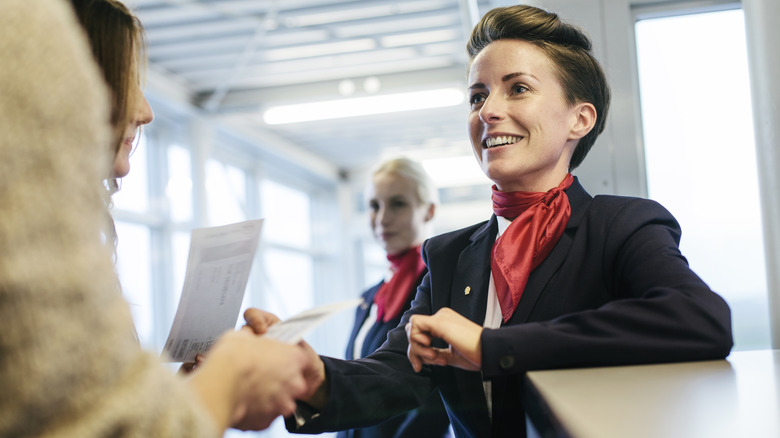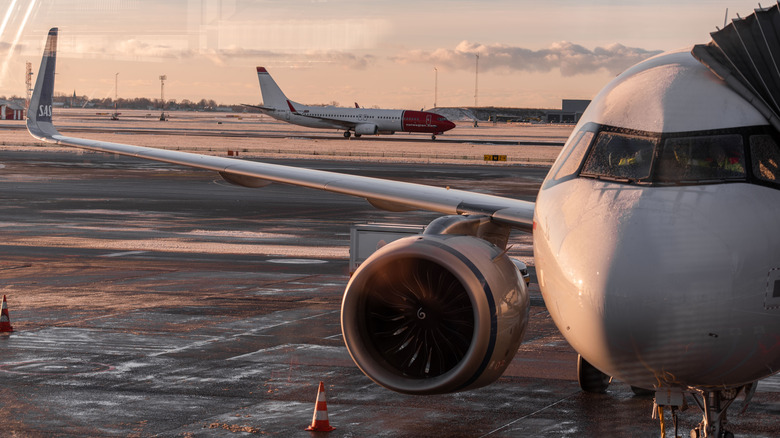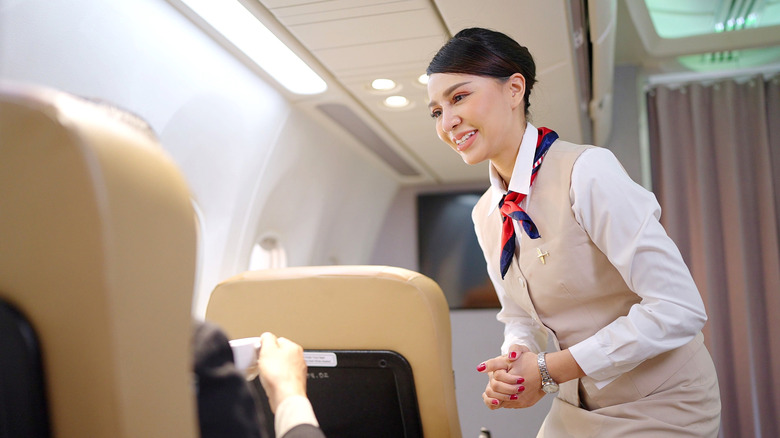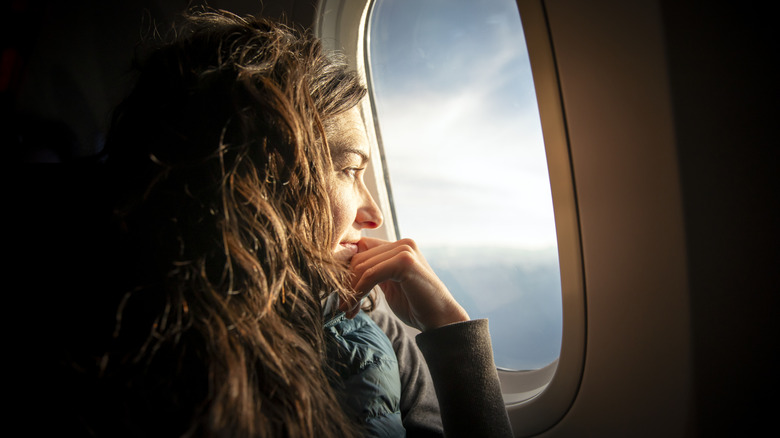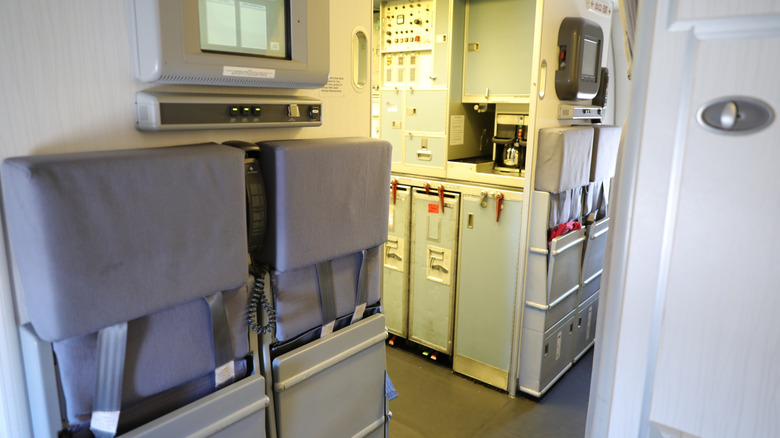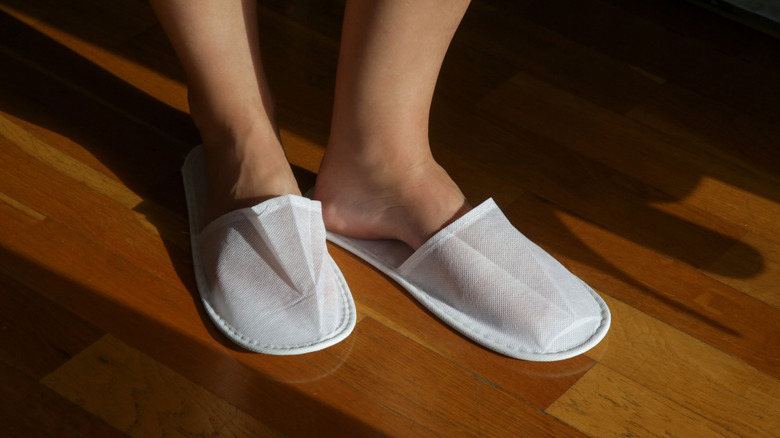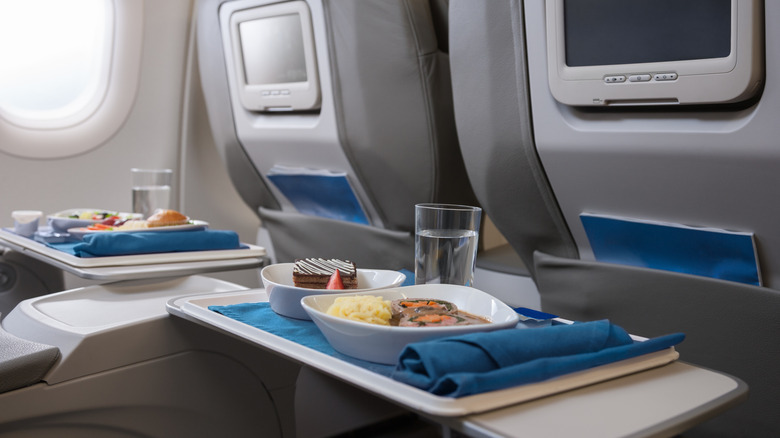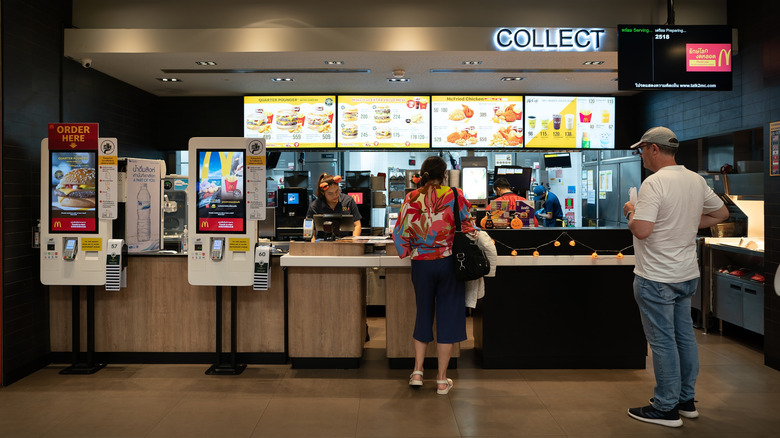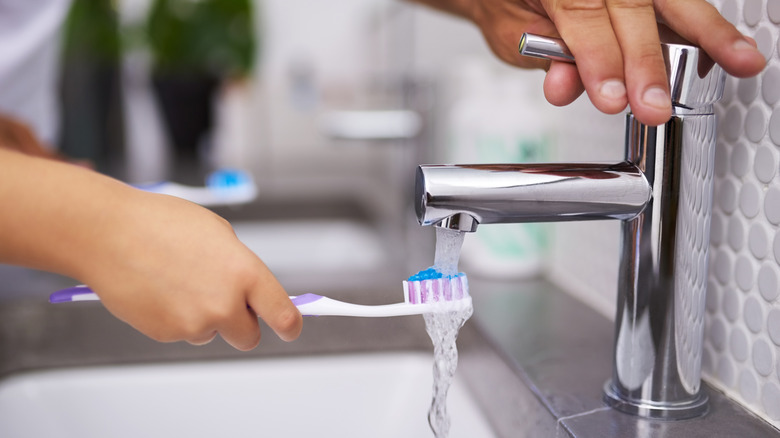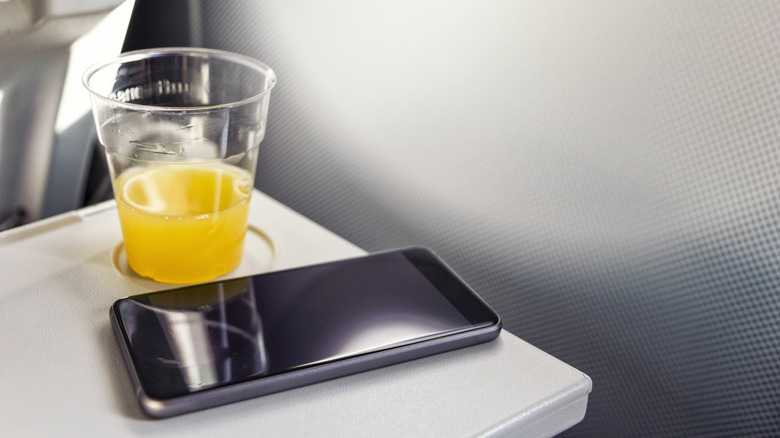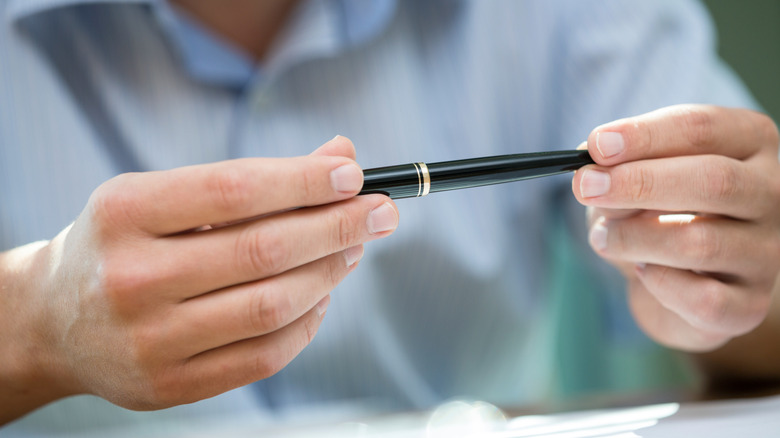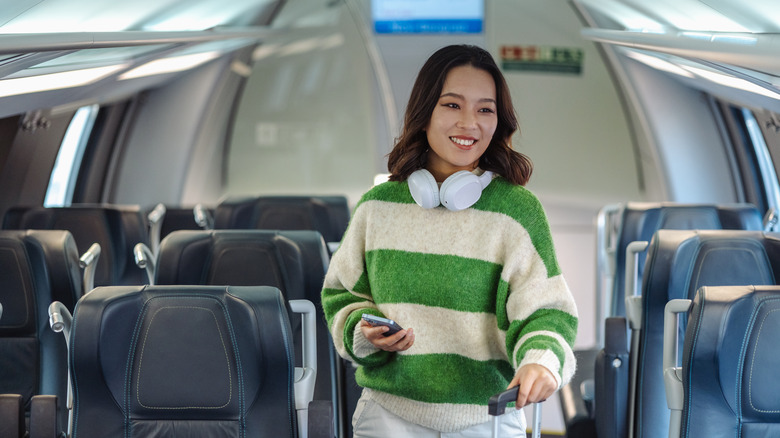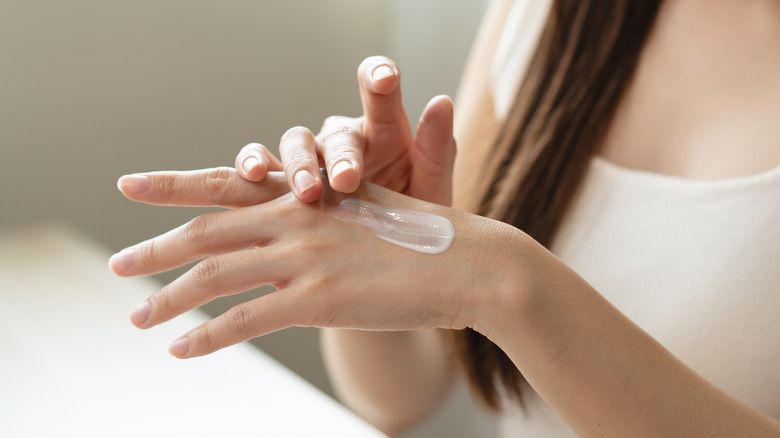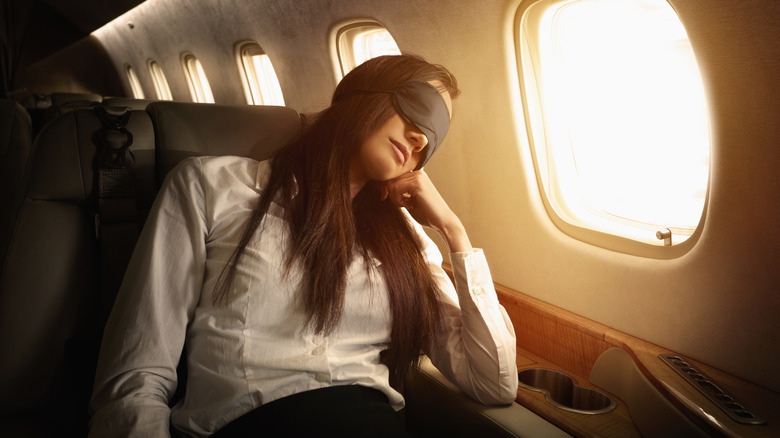The Most Clever Tips And Tricks Flight Attendants Use While They Are Passengers
To many, battling through airports and onto crowded flights is simply part of modern life. However, no matter how seasoned we think we are, we'll never have as many air miles under our belts as those who take care of us in the skies. Flight attendants know the ins and outs of air travel better than anyone, from long-haul flights to short cross-country trips. They spend most of their working lives cruising at 30,000 feet, so it's only natural that they will have insider tips and tricks that most of us have never even considered, no matter how often we fly.
Thankfully, cabin crew aren't interested in keeping all this precious knowledge to themselves and have happily shared their go-to travel hacks with the internet so the rest of us can have more comfortable flights — you just need to know where to look. From what not to eat on the plane to the best seats to book, and how to avoid drying out like a prune during a long flight, they've got tips for almost anything. And now, so do we! Take this invaluable advice on your next flight to elevate the experience.
Always fly in the morning
Getting to the airport at the crack of dawn can often be tiring, but it's actually the best time to book a flight, especially for anxious fliers. Flight attendants have been on flights at all times of the day and night, and according to Allie Malls, she always heads to the airport at the crack of dawn. Talking to CNN Travel, flight attendant Malls explained, "That's my trick. I don't know if I should actually be telling everyone. Otherwise, they're going to take all my morning flights."
Why does Malls decide to roll out of bed and into the airport at first light? Early morning flights are typically less likely to experience delays due to bad weather. On top of this, turbulence is better at the start of the day than in the afternoon, as there is less heat coming from the ground. While you might feel like catching a later flight is better for your energy levels, if you need to stick to a rigid schedule, it may be better to take their advice.
Ask the flight attendants as many questions you like
It's no secret that flight attendants are busy people. While we may be on the flight on our way to a lavish vacation, taking to the skies is just another day in the office for flight attendants. And because we see them rushing around, grabbing drinks, and tending to other passengers, it's easy to think that asking questions might bother them. However, despite how busy they may seem, flight attendants are always happy to answer any queries you may have, no matter how big or small.
If you're stuck on a delayed flight, ask the FAs for everything you need to know. Speaking to CNN Travel, British flight attendant Kris Major said "there's no point" in withholding information from passengers. Cabin crew are there to help during the flight and if travelers need assistance figuring out their next steps if they miss a connection. It's their job to help, so don't be afraid to speak up.
Book the window seat for maximum comfort
There are many genius hacks that make flying economy a lot more comfortable, but this might be the simplest one of all. Some people like sitting in the aisle seat so they can stretch their legs a little bit, but according to former flight attendant Beth Windsor, the most comfortable seat to book on the plane is actually the window seat.
In a piece written for Business Insider, Windsor explained, "Yes, you may need to squeeze past your fellow passengers to get to the bathroom, but that may not be often depending on your bladder. Still, asking to exit the row is worth it to have a place to rest my pillow and an armrest of my own (the middle seat always loses out)." It's easier to lean against a wall than the person sitting next to you, especially if you don't know them. As an added bonus, you get to sit back and watch the view as you climb to 30,000 feet. Just be prepared to have everyone staring over your shoulder to catch a glimpse of the clouds.
Avoid seats by the restroom or galley
Considering how far removed you are from the ground, flights are often louder than you expect them to be. After all, 200-plus passengers flying in a figurative tin can make a racket at times, and you've also got the noise of the plane itself to contend with. There are some things you can do to get a quieter experience — such as good earplugs and an eye mask — but flight attendants know that the noise level can be dependent on which seat you book.
Former FA Beth Windsor explained in an article for Business Insider that she's savvy enough to know which parts of the plane to avoid. "I'll never book a seat by a restroom or galley (where food is prepared) as I know just how noisy and busy it will be," she revealed. "I also avoid bulkhead seats — people with babies often book this area because it's where bassinets for infants can be placed." It's also best to avoid the row behind the wing, as you'll be close to the constant whirring sound of the engine.
Always pack hotel slippers
Comfort is the key to success on any flight, especially if it's a long haul. Many passengers end up taking their shoes off at some point to give their feet a little more room to breathe. However, as comfortable as you might feel with your shoes off, the other passengers might not be so thrilled to see your socks or bare feet. Luckily, there is a compromise. Beth Windsor told Business Insider that her must-have travel item is a pair of cheap hotel slippers, as they're comfortable enough to wear on a flight and disposable enough to ditch at the other end of the journey.
"I also wear slippers when I walk to and from the bathroom. After being flight crew, I'll never ever go into a plane restroom without something more substantial than socks on my feet," she explained. Windsor's tactics make perfect sense, as restroom floors can harbor all sorts of nasty bacteria — especially if someone was caught mid-flow when turbulence hit. Yikes.
Don't eat the plane food if you want to feel good
Have you ever wondered what flight attendants eat on a long flight? Some may eat the same food options as you, while others choose to bring their food in, but that's on the clock. What about when they're a passenger? Even if the meal is paid for as part of their flight seat, some attendants choose to avoid it altogether as they know it's not necessarily the most enjoyable thing you'll eat in your life. Of course, this depends on which company you're flying with, as some airlines are taking in-flight dining to the next level.
Still, the majority of in-flight meals aren't great. The additives — such as salt and sugar — can make you feel pretty lethargic, bloated, and dehydrated, adding another layer of negativity to those feelings caused by the low humidity levels on the plane. Next time you fly, take a leaf out of former FA Beth Windsor's book and grab some sushi at the airport, or take pre-prepared healthy snacks that will see you through until you reach your destination. No one wants to turn up to their vacation feeling like a dried-out, underfed prune, so be prepared with sustenance before the next time you take to the skies.
Eat before you get on a long haul flight
During a long-haul flight, you can usually expect two or three meals and snacks, although this will vary depending on your airline. It can sound like a pretty good deal and make the idea of flying for a long period of time stress-free. However, all that glitters isn't always gold, and just because it curbs your hunger doesn't necessarily mean it's going to be the best thing for you, but there's something else you may want to do instead.
British flight attendant Kris Major told CNN Traveler that when faced with a long or overnight flight, seasoned travelers in the know choose to eat before boarding so they can get some shut-eye as soon as they settle into their journey. Prioritizing sleeping instead of snacking means you can arrive at your destination feeling (relatively) recharged and ready to go. Considering how long most of us spend in the airport before our flights, it makes sense to eat on the go. This isn't going to be a one-size-fits-all situation, though. If you're flying with a premium airline such as Emirates, the in-flight food may not be something you want to miss.
Brush your teeth when you reach your destination
When thinking about things to pack to make an ultra-long-haul flight more bearable, toothpaste and a toothbrush should be at the top of your list. According to FA Kris Majors, you're going to want to freshen up when you disembark the plane. Talking to CNN Traveler, Majors (who had over 25 years of experience as a cabin crew member) revealed the trick to feeling rejuvenated after a grueling flight.
"Cleaning your teeth is always the one that freshens everybody up the most," he explained. Apparently, FAs have around 10 minutes to go to the bathroom before they have to head back to work, and taking a few minutes for a minty pick-me-up is priceless. It's such a simple thing to do, but one that Majors values and it's worth trying out next time you find yourself staring sleepily in the restroom mirror at the airport. Thankfully, plenty of companies make handy travel-size toothpaste tubes and toothbrushes that can stow away neatly into your carry-on.
Ditch the caffeine for fruit juice or water
For weary passengers, it's more than tempting to seek out a caffeine hit when the hostess trolley rolls by. While it may perk you up for a short period of time, too much caffeine can actually be detrimental. Flying can make you dehydrated anyway due to the low humidity in the cabin, and caffeine is a diuretic, meaning you might find yourself heading to the toilet more often than you usually would. This can lead to further dehydration, creating a vicious cycle in the sky.
Flight attendant Laure Guilfoyle told Reader's Digest that passengers should avoid drinking too much coffee. "When you're flying long-haul, the number one rule is to drink plenty of water because the air circulation can dry out your skin," she explained, going on to recommend that travelers would be better off sticking with classic H2O or mixing things up with fruit juice instead. Drinking plenty of liquids and trying to get 40 winks is much better for your body than powering through on a coffee buzz.
Take your own pen on international flights
If you're a seasoned traveler, it's likely you've mastered the art of packing just one carry-on for a week-long vacation. This method is much easier than going through the bag check process, and it avoids the chance of luggage getting lost. But no matter your luggage preference, flight attendant Vanessa Settimi says there's one thing that passengers should always ensure they have easily to hand — a pen.
Settimi — a Swoop Airlines employee — told Reader's Digest that it's always useful to have a pen within reach if you find yourself needing to fill out a customs card or other documentation before you land. While the cabin crew will be glad to lend you one, there's a finite supply on planes, and they can quickly get scooped up if multiple passengers find themselves in need of one. Pens don't take up any of your precious carry-on space, so this tip is a no-brainer. There's also hygiene to consider. Health-conscious passengers may not want to hold a pen that many other strangers have handled before.
Wear layers and sensible clothing
Most of us know the things you should never wear on a plane, be it tight jeans, flammable leggings, or anything that compromises comfort for aesthetics. Dressing for comfort is pretty much common sense, but flight attendants have a much deeper understanding of what makes the perfect flying outfit, as they know the environment better than the rest of us. Vanessa Settimi told Reader's Digest what's on her never-wear list under any circumstances: "Now this might just be the flight attendant in me," she explained. "But you will never catch me flying as a traveler in sandals and a tank top!" That may sound like a relatively simple get-up to the rest of us, especially if you're headed to warmer weather, but Settimi said that comfort isn't the first thing on her mind. Safety is.
According to Settimi, the ideal outfit is comfortable clothing that won't hinder you if you need to exit the plane quickly. This includes ditching flip-flops for footwear that won't fall off if you need to scramble out, so perhaps a good pair of breathable sneakers would be a better bet. Layers can also be beneficial in case you get too hot or too cold on the plane.
Wear lotion to stay fresh
We're often too busy thinking about getting to our destination or catching some shut-eye to think about the impact flying has on our skin. Dr. Paris Archarya told Harper's Bazaar that it has more of an effect than many realize. "During and after a flight, many people will experience various skin concerns, including breakouts, puffiness, and dry skin," she explained, adding that the low air pressure and low humidity in the cabin are largely to blame.
As you might expect, this is particularly bad for flight attendants who are on planes all day, every day. Former FA Beth Windsor explained in a Business Insider piece that she has learned to be generous with lotions while traveling. "I always give myself a mini facial on long-haul flights. I use an intense hydration sheet mask and under-eye gel patches, then apply my moisturizer and SPF 50," she revealed.
Even for shorter flights, Windsor ensures she is already wearing hydrating lotions and serums before she gets on the aircraft. Though the thought of doing so much self-care on a flight full of strangers might sound a little daunting, you'll have the last laugh when you're glowing post-flight.
Don't sleep your way through long haul flights
It's more than a little tempting to hop on a long-haul flight, put your earplugs in and your eye mask on, and try to sleep through the entire thing. Many travelers want to pass the time away as quickly as possible, but this can impact how our bodies deal with jet lag when we finally arrive at our destinations. British flight attendant Kris Major told CNN Travel that it's the worst thing passengers can do. "Don't just go to sleep and just sleep your way through, because you're staying on your own time, you're not helping your own body clock to readjust your circadian rhythm," he explained.
It may sound complex, but your circadian rhythm is simply your body clock, which lets your body know when it needs some precious shut-eye. The secret to beating jet lag is to try and adjust to the new time as quickly as possible, so it's best to resist fighting it — unless you're only there for a short period of time. According to Major, some FAs who only have a day in their destination will stay on their own time, as it's easier.
